Peter MALONE
Saturday, 18 September 2021 19:54
My Name is Modesty: a Modesty Blaise Adventure

MY NAME IS MODESTY: A MODESTY BLAISE ADVENTURE
US, 2003, 78 minutes, Colour.
Alexandra Staden, Nikolai Coster- Waldeau, Raymond Cruz, Fred Pearson, Valentin Teodosiu, Eugenia Yuan.
Directed by Scott Speigel.
In the 1960s, there was a colourful film version of the Modesty Blaze comic strip, directed by the unlikely candidate, Joseph Losey, American expatriate because of the blacklisting, making films in the 50s and 60s in England. It featured Monica Vitti in the title role, the supporting cast included Dirk Bogarde. It was filmed in the style which was later to become more popular, comic-strip style.
This version is presented by Quentin Tarantino, the kind of film that he probably liked to rent out when he worked in his video store. While it eventually does have some action, there is a great deal of talk in conversation, as well as in the important flashbacks to tell Modesty’s story and her origins.
British Alexandra Staden is Modesty, the adult. However, we see her first as a young girl, in the wars and devastation in the Balkans in the 1990s. She is ragged, hungry, encountering some soldiers who are kind to her and give her some food. As the film progresses and Modesty encounters the arch-villain, a young Nikolai Coster- Waldeau, Miklos, robbing the owner of a profitable casino in Morocco, killing him, massacring guards, taking hostages and killing some of those, a ruthless man who says he is avenging his father’s death. He decides that he will play roulette with Modesty supervising, as we have seen her do in the casino, fixing the wheel when a vain high-flyer wins too much, and then loses it all, under the supervising eye of the casino owner.
The bet while they play is that he will let a hostage go and she will answer questions honestly about her background.
The little girl escapes with a Professor on the run, a wise man, who becomes her father-figure, instructing her about life, teaching her to read, drawing on Mallory’s Mort d' Arthur, the book that he carries with him. The film shows their varied adventures, escaping from soldiers, wandering through Turkey, surviving, sometimes with difficulty, and she growing up with education and mastery of languages.
When the Professor is killed in an attack, she is hungry, adrift in Morocco, picks a wallet in the marketplace and is noticed by the owner of the casino who then takes her under his wing and offers her a job.
Modesty does mention in passing that she was trained in Asian martial arts – and, when Miklos, thinks he has the upper hand, she brings her abilities into vigorous and instant action, fighting with Miklos, who eventually falls over balustrade into the main area of the casino.
This is a straight to video, straight to DVD film, short in running time, spending a lot of time on the interaction between Modesty and Miklos, their battle of wits, introducing some violence in the attack on the casino owner and his murder, some callous violence against the staff in the hotel, Modesty taking moral control, getting Miklos to allow a wounded staff member to be taken to hospital, supporting one of the workers who suffers from low self-image, who also stands up to the attackers, gaining in herself-image.
The brief film is an enjoyable action pastime, comic-strip style, and an addition to the cinema of Modesty Blaise.
Published in Movie Reviews
Published in
Movie Reviews
Tagged under
Saturday, 18 September 2021 19:54
Seventh Son
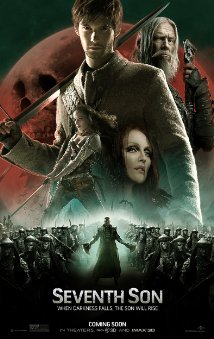
SEVENTH SON
US, 2015, 102 minutes, Colour.
Jeff Bridges,Ben Barnes, Julianne Moore, Alicia Vikander, Antje Traue, Olivia Williams, John De Santis, Kit Harrington, Djimon Hounsou, Jason Scott Lee.
Directed by Sergei Bodrov.
What fans to do now that The Lord of the Rings cycle and The Hobbits cycle now complete, after 14 years? Television viewers are already hooked on Game of Thrones, and for several seasons. Seventh Son is a kind of interim filler. It is based on a young adult novel by Joseph Delaney, The Spook’s Apprentice.
A great deal of money has been spent for the budget of this film with plenty of colourful sets and vigorous action up there on the screen, especially with a 3D version. With mediaeval castles, isolated and lonely villages, flying dragons, evil witches, seventh sons with power to cast out the witches and demons who are instantly and spectacularly cremated, there may be enough to satisfy those who really love this kind of thing.
But it is not quite enough, even though one of the contributors to the screenplay was the British Stephen Knight (Dirty, Pretty Things, Locke). Despite a lot of high flying, it is much more on the pedestrian side, imaginative and creative language not one of its strengths. And then there is the question of Jeff Bridges’ half- swallowed voice and semi-English accent which may mean that he was trying to channel Ian Mc Kellen as a new Gandalf. And then there is the British star and the Danish star affecting some kind of American twang.
The film opens with the Master Gregory (Bridges) imprisoning what seems a forlorn victim beneath a domed metal grate. When time passes and the grate melts, we realise that he had a point. He has tried to imprison mother Mother Malkin, truly a malevolent black-clad witch who, inevitably, once loved Master Gregory but who is into incantations, spells, destroying enemies – and in the meantime transforming herself into a vicious dragon sweeping through the skies. Mother Malkin is played by Julieanne Moore which seems to remind us that many actresses (think of Meryl Streep recently in Into the Woods, or Julia Roberts, or Charlize Theron, or Angelina Jolie) feel that a wicked witch should be part of their repertoire. (Now, with a well deserved reputation and Oscar, Julianne Moore can do what she likes).
Master Gregory has apprentices who are seventh sons but fail to serve out their time, being destroyed by witches or Mother Malkin. He finds another apprentice in the form of Tom Ward, Ben Barnes, who has mysterious prophetic dreams and feels called to his mission, despite all the attacks, pursuits, his having to jump off a very high cliff with Master Gregory, going over waterfalls, falling from another cliff, all kinds of endurance and confrontations, including the attraction of Alice (Alicia Vikander), daughter of a witch, who loves him but is not above bewitching him to steal his protective metal, given to him by his good witch mother, Olivia Williams.
In many ways, the action is the old Saturday Matinees style, chases, confrontations, battles, and even a literal cliffhanger. Which means that audiences who have a reasonable tolerance for this kind of adventure might find it entertaining while it is up there on the screen – and then forgotten.
The director is a Russian, Sergei Bodrov, the Russian director who has made interesting films in the past, Prisoner of the Mountains, Bears Kiss and Mongol, the rise of Genghis Khan.
1. An entertaining fantasy? Young adult novel? Drawing on the token imagination?
2. The title, the special gifts of a seventh son, the search for such sons?
3. The medieval setting, the village, the mountains, the waterfalls, cliffs? Castles, exteriors and interiors? Costumes, decor, the school?
4. The special effects, the Dragons, the transformations, flight, battles?
5. The action, the confrontations, power, magic?
6. The initial imprisonment of Mother Malkin? The melting of the bars over time? Her getting free?
7. Master Gregory, his imprisoning the witch, the confrontations, his task, eliminating demons and witches? his assistant, awkward, being caught in the cage, his death? Gregory and his age, status in the village? His going to the good witch, seeing her children, Tom and his visions? His destiny? Following Gregory? His apprenticeship and experiences?
8. The dragon, Mother Malkin, in herself, the past, the relationship with Gregory? Followers, the other witch, the daughter? The power, evil, transformation? The confrontation? The destruction?
9. The disciple witch, the daughter, half-human? The attraction to Tom? In love? Yet the influence of her mother, stealing the medallion? Changing, rescuing Tom, love?
10. Tom, his mother, allowing him to go with Gregory? The confrontation with Mother Malkin, her death? Tom and his character, loyal to Gregory?
11. The range of adventures, the large ogres, Jim on? The fights, flight, jumping from the Cliff, on the ledge, the rescue? Radu as a foe?
12. The final confrontation, Gregory retiring, Tom becoming the master, and an enjoyable adventure?
Published in Movie Reviews
Published in
Movie Reviews
Tagged under
Saturday, 18 September 2021 19:54
Most Violent Year, A
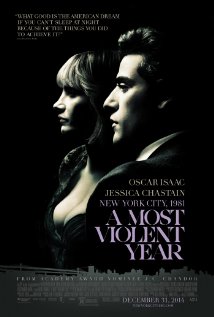
A MOST VIOLENT YEAR
US, 2014, 122 minutes, Colour.
Oscar Isaac, Jessica Chastain, Albert Brooks, Alessandro Nivola, Catalina Sandena Moreno, Peter Geraty.
Directed by J. C. Chandor.
Many of us would think that in any year could be well named a most violent year. For the film makers, the choice is 1981, New York City.
This is very interesting drama, taking us into industrial issues in the United States, the ambitions of big companies, wheeler-dealing, the use of violence to put competition out of action. This has been a long time theme in American films, considering the 1950s and the look at unions and workers and power struggles in On the Waterfront, or in the 1980s, the biography of the teamsters boss, Jimmy Hoffa, with Jack Nicholson as Hoffa.
This film has been written by J.C.Chandor, who made his mark with a very interesting film about Wall Street, financial deals, speculations and risks, covert action in Margin Call. While expectations might have been that he would made another intense drama, he did do so, but confined his action to a yacht in trouble in the Indian Ocean, and one sailor battling the elements, Robert Redford in All is Lost. Now, he has moved back to New York City and strong drama.
The focus of the struggles is the trucking industry and the transportation and distribution of fuel. Oscar Isaac, becoming well known as a leading actor (Inside Lewynn Davis, Ex Machina), plays Abel Morales, a man of principle, who wants to do the right thing, but finds himself and his trucks and drivers targets of unknown boxes and their thugs, intimidating and bashing the drivers, stealing the fuel. At the same time, the industry is under investigation by the authorities, especially in the person of DA, Lawrence, played by David Oyelowo, the British actor, settled in the United States, appearing frequently in all kinds of films including The Butler, The Paperboy, his acclaimed performance as Martin Luther King in Selma. There is a very strong performance from Albert Brooks is a lawyer adviser.
Behind Abel is his strong-minded wife, and business partner, played by Jessica Chastain. A major complication is that Abel’s plan is to buy an abandoned terminal to turn it into a centre for his oil distribution. Negotiations are well under way with the Jewish community who own the property. He makes the required deposit, has 30 days to pay the rest of the money or he will lose the deposit. With the complications of the attacks on his trucks, the suspicions of the investigating authorities, it would seem that he will not be able to find the money, despite his sounding out various friends and associates, and will lose the edge on his business.
Part of the complications for Abel as well as for the audience is that it is not clear who are the powers-that-be behind the attacks on the trucks, the thugs just being hired without knowledge of who was really employing them. Another complication is Abel’s helping a young man in his work, the young man fearful, carrying a gun against the thugs and running away, compromising Abel.
On the one hand, this is an interesting drama about social issues in the American context. On the other hand, it is an interesting drama about a good man trying to do his best in the capitalistic world, becoming a victim, the whole process causing great personal and physical tension, complicated by the influence of his wife.
A Most Violent Year might well be called an adult drama in the best possible sense.
1. The title? Tone? The choice of 1981? The trucking industry? Fuel industry?
2. New York City, the atmosphere, the buildings, the streets, the neighbourhoods? The terminal, offices? Police offices? The score?
3. The director, his work, interest in psychological and social cases?
4. Audience knowledge of New York rackets, interest, the social issues, thuggery, the law and investigations?
5. Abel, the central focus, his character, background, Hispanic, his marriage to Anna, the family, the extended family? His helping other families? Luisa and Julian? his principles, the law, the investigation? His associates? Andrew, friendship, advice? The deal for the terminal, the bargaining with the Jewish community? The money, the outlay, 30 days? Anna and her help?
6. The sabotage to his trucks, the stealing of the oil, storing it? The trucks, the bashings of the drivers? Their fears? Julian, young, driving, fear? His having a gun, carrying it? His being accosted, firing it, the chase? The suspects?
7. Abel, the district attorney, his investigations, his attitudes towards Abel, the evidence, Abel hiding the documents from home, the DA and his visit to his home? Anna, her accounts, her explaining the she had skimmed the money, the reasons?
8. Abel meeting with the bosses, the discussions, suspicions? Peter and his role? The visits? Abel and his need for a loan, the bank’s refusal, the daughter and her father and their agreeing?
9. Julian, the injury, in hospital, his wanting a second chance, Abel and his friendship with Luisa, support? His fears, firing the gun, fleeing, giving himself up, the stance with the DA and the police, shooting himself?
10. Abel getting information, the truck and the car chase, the thugs, the confrontation, not getting any detailed information?
11. His confronting the boss, the issue of the storage of the oil?
12. Abel getting the money, the payment for the deal, the terminal and his prospects? A story of the 1980s? Now?
Published in Movie Reviews
Published in
Movie Reviews
Tagged under
Saturday, 18 September 2021 19:54
Eastern Boys
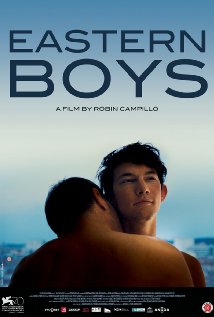
EASTERN BOYS
France, 2013, 128 minutes, Colour.
Olivier Rabourdin, Kirill Emelyanov, Daniil Vorobyov.
Directed by Robin Campillo.
Eastern Boys is surprisingly moving film. While it focuses on teenagers and young men, migrating from Eastern European countries, with no documents, trying to survive in a city like Paris, sometimes working as prostitutes, it portrays its character with quite some humanity.
The film opens in Paris’ Gare du Nord, the imposing exterior, the very busy interior, the passengers going in and out of the station, the mixture of backgrounds, ethnic differences, a situation that ordinary people could identify with. Then the film starts to focus, with its overhead shots, at individuals, their forming small groups, forming larger groups, looking like a gang, which they are, going to enjoy takeaway food, and one of the young men going off by himself, sensing that a middle-aged businessman was loitering, watching him, wanting to proposition him. No words spoken for at least 10 minutes but the audience is strongly aware of what is happening.
When the young man, Marek, agrees to visit the man’s apartment, all seems set for a film about gay men, sexual relationships. While something of this does happen, the film has a lot more going on and a lot more going for it. There is a very disturbing sequence, especially for the businessman, Daniel, when the group of young men come to his apartment, really innovated, and, while dancing to rock music, remove all his possessions to a truck downstairs. The instigator, a Russian somewhat older than the others, nicknamed The Boss, is an intense and possibly psychotic character.
But the film is about the relationship between Marek, who reveals that his real name is Rouslan and that he is a migrant from Ukraine, though his parents worked in Chechnya and were killed there. At first, his response to Daniel is quite impassive, letting himself be a sex object for a client. But, he returns and continues to return so that the relationship becomes far more personal even in its sensuality.
There is a further surprise in the relationship between Daniel and Marek, a change of attitude, a change of behaviour, different kinds of feelings in Daniel, more paternal than sexual.
However, as might be expected, there is still trouble to come, especially from The Boss, who has dominating roll over the group of men as, helped by Social Services, they occupy some apartments in a suburban hotel. His control extends to locking their documents, if they have any, in a locker in the hotel. When Marek attempts to retrieve some documents, The Boss responds with ferocity and quite some brutality.
The film does not end as we might have expected. There is a clash between The Boss and Daniel but the screenplay opts for a non-violent solution, in fact, one that leaves Daniel and Marek – and the audience – with quite some hope and alternate possibilities for the future and their relationship.
Director, Robin Campillo, uses his camera expertly to focus on the central characters, quite sympathetically, meaning that he tells his story with quite some feeling.
1. Acclaim for the film, the European setting, France, 21st century?
2. The title, migrants, undocumented, from the East? From Russia, Ukraine, Chechnya? Their experiences, illegal migrants, the number in France, survival in home countries, the support from a commune, individual survival, prostitution? A humane perspective?
3. Paris, the Gare du Nord, exteriors and interiors, a tone for the opening? Ordinary, the crowds of people, the passengers, audiences identifying and with this railway situation? The comparison with the end, the court, looking at the window, the street? This story in an ordinary French setting?
4. The initial 10 minutes, no dialogue? The boys, individuals, coming together, the big group? Security, the chase? Eating takeaway? The Boss and his behaviour, his influence? The audience supplying words?
5. Marek and his walk, leading Daniel on, Daniel, his age, arrival, luggage, watching Marek, loitering, meeting him, the proposition, Marek’s strong
response?
6. Daniel at home, the knock on the door, the boy calling himself Marek, yelling threats? The others coming in? The leadership of the Boss? Mareck as one of the group? Intimidating Daniel, his reaction, quiet, upset about the ice and the fridge, the Boss and menacing him? The Boss, taking off his shirt, the threats, dancing, the music? The others dancing? Dismantling all the goods, packing them in the truck? The collage of Daniel’s response, the Boss and his smashing the boy on the table?
7. The Asian maid coming in and cleaning, later seeing Marek?
8. Marek and his return, more personal, the several visits, feeling more at home, eating, setting up a routine visits, the payments? The developing relationship, the gifts, installing the television and watching it?
9. The effect on him, on Daniel? The sexual encounters and their sensuality, Marek at first impersonal, later responding? Daniel and his decision not to have sex, setting up a separate room, feeling more fatherly? At the supermarket, listening to Marek’s story, in Chechnya, the parents, his sister and the dream about the headless corpses in the river, the bomb on the house? The decision to have separate rooms, Marek and his worry about rejection? The fireworks, disturbing his sleep, memories of the bombs?
10. Marek wondering whether Daniel believed him? His real name, Rouslan? Issues of trust, belief, change? Marek more at home, setting up the new room? the plan to leave, the Boss having the documents in the safe? His waving happily to Daniel? Hope?
11. His return to the apartment block, buying the milk for the Boss, feeding the baby, the mother and father going to the shower? His getting the key? Accosted by the group at breakfast? His going to the room, trying to find the box, the concierge coming, the Boss coming and taking the key, in the room, questioning him, stomping on his head, his being tied up, gagged? His moaning?
12. The other members of the group, their life together, the young boy, their solidarity together, the storeroom full of the robbery goods?
13. Daniel, arriving in his car, the concierge, the search, the room at the hotel? Persuading the concierge to open the door, saving Marek, taking him to his room, calling the police? The roundup, his car in the garage, warding off the Boss, leaving?
14. The Boss, the key to the apartment, finding it empty, his tears of self-pity?
15. The court, the adoption process, the argument that they did not want a civil union so that the adoption was genuine? Free?
16. Themes of migrants, undocumented, surviving, French authorities, gangs, prostitution, clients, a more humane approach, possibilities for hope?
Published in Movie Reviews
Published in
Movie Reviews
Tagged under
Saturday, 18 September 2021 19:54
Woman Between, The
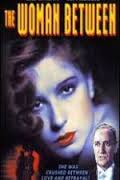
THE WOMAN BETWEEN
US, 1931, 74 minutes, Black-and-white.
Lilly Damita, Anita Louise, Lester Vail, O.P. Heggie, Miriam Seeger.
Directed by Victor Scherzinger.
The plot of The Woman Between is the material of soap-opera and is the kind of story would be very popular in many films in succeeding decades as well as television series and miniseries. It involves an elderly businessman whose wife has died and he has married again, despite the objections of his daughter and of his son. The son objected so much, in memory of his mother, that he left home for many years. As the film opens, he is returning, unexpectedly, and the family is in some turmoil, especially concerning their father’s second wife, the fashion businesswoman, Julie (Lilly Damita).
We are introduced to the father, a seemingly respectable man. We are introduced to his daughter, Doris, a touch flighty, certainly opposed to her step-mother. We also meet her friend, Helen, who is anxious to meet the returning prodigal. Her parents are also guests at the dinner to be held in his honour. The question is whether the stepmother will come, just having returned by ship from Europe.
When they will meet, it is clear that there is something in this and that there is some connection between the son and Julie.
1. The film styles of the early 1930s, black-and-white photography, drawing rooms, dining rooms, fashion shops…? The sound engineering at this early period?
2. The cast, popularity in the 30s? The musical score?
3. The basic plot, soap opera, audience interest in the characters and the situations in the clashes?
4. The introduction to the main characters, the father, businessman, widower, devotion to his wife, decision to marry again, Julie? Her keeping her independence and managing her fashion store? Doris, dislike of Julie, eager to see her brother, her friend Helen and the buying of the dress, Julie’s advice,
her mother’s disdain for the dress, Helen’s father, the mother’s dominance?
5. Victor’s arrival, the excitement, the reconciliation with his father, with Doris, meeting Helen amazed at her growing up?
6. Julie, wary of going in, listening, her husband inviting her, the meeting with Victor, suspicions there was something between them, saying they were on different boats?
7. The role of Doris, relationship with her father, with her brother, antagonism towards the stepmother? Her behaviour at the meal?
8. The father, his behaviour, his wife, Julie, the impact at the dinner?
9. The son, return, long years away, the relationship with Julie, at the house, the pretence, talking together?
10. The final revelation, melodramatic?
Published in Movie Reviews
Published in
Movie Reviews
Tagged under
Saturday, 18 September 2021 19:54
Something to Talk About
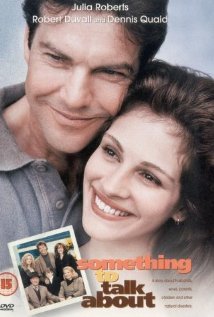
SOMETHING TO TALK ABOUT
US, 1995, 106 minutes, Colour.
Julia Roberts, Dennis Quaid, Robert Duvall, Gena Rowlands, Kyra Sedgwick, Brett Cullen, Muse Watson.
Directed by Lasse Hellstrom.
Something to Talk About was written by Callie Khouri, who had written Thelma and Louise and was to write the television series, Nashville. It was directed by Lasse Hellstrom, the Swedish director who made an impact with My Life as a Dog (after filming the ABBA the tour in Australia). His films range from The Cider House Rules to Chocolat to The Hundred. Journey.
This is a domestic drama, focusing on a strong-minded woman who discovers that her husband has been having an affair, Julia Roberts and Dennis Quaid. This raises issues with her father, Robert Duval, and her mother, Gena Rowlands who was silent although lifetime about her husband’s relationships. Kyra Sedgwick is the sister.
The setting for the film is a horse stud and the racing of horses, a focus on Julia Robert’s daughter and her writing as well as the good advice of the trainer, Muse Watson.
This is a portrait of an American family – with implied critique, the possibility of change, change of heart and future.
1. A picture of an American family? Affluent? Success? Problems and solutions?
2. The city, homes, offices, restaurants, workplaces? The contrast with the country, the mansion, the stables? The competition sites? The musical score?
3. The title, generic, for each of the characters?
4. The focus on Grace, her relationship with her husband, her daughter, her parents, her sister? Employees? The interactions with each of them? The background of her story, as a little girl, the two sisters, love for horses, the demanding father, the more passive presence of the mother? Her cooking, the kitchen scenes, professional? The tensions with her husband, seeing him with the other woman, her anger, ousting him, her father and his advice to make up, her mother reticent? Her exasperation? Going out, in pyjamas, with her daughter, seeing her husband and the restaurant, making a scene? The discussions with her sister and her advice? Her daughter, her age, a love for horses, being with the horses? Her father and the clash with the trainer, taking his side? The schools, the decision to meet with her husband, talking, the meal, the possibilities? Going out with the trainer, going back with him, the possibilities of a sexual encounter, his willingness, her decision to leave? The final competition, her father conceding defeat, the trainer’s victory?
5. Eddie, his marriage, his work, love for his wife, his daughter, the affair, in the street with the girl, Grace and making the scene in the restaurant, his being ousted? Having to sort things out, the meeting with Grace, their talk, the meal? Memories? The mutual faults?
6. The young daughter, strong character, support of her mother, and love her father, wanting them together, with the horses, her riding, her skills?
7. Grace’s parents, the years of their marriage, love, his infidelities, the mother being tolerant, the father and his whims, buying horses, employing the trainer, the competition with his old trainer, the rivalry? The mother, the discussions with Grace, Grace’s anger, challenging, taking stronger stances, ousting the father, his sitting on the steps?
8. Grace’s sister, strong character, independent, giving advice, not taking nonsense from her parents?
9. The rival trainer, his going into the competition, Grace’s father, his losing, congratulations to the trainer, the celebration?
10. An optimism that human nature is basically good and that problems can be sorted out?
Published in Movie Reviews
Published in
Movie Reviews
Tagged under
Saturday, 18 September 2021 19:54
Dr Seuss' The Lorax/ The Lorax
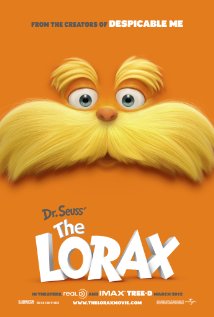
DR SEUSS’ THE LORAX/ THE LORAX
US, 2012, 86 minutes, Colour.
Voices of Danny de Vito, Zac Efron, Ed Helms, Taylor Swift,
Directed by Chris Renaud, Kyle Balda.
This one is for younger, much younger audiences, so parents might have to bear up.
The Lorax, so he tells us at the opening, is the guardian of the forest and the trees (he is voiced by Danny de Vito). He recites a few of Dr Seuss’ rhyming lines to introduce the story. But, then, with some acknowledgements to the author’s writing style and the illustrations, it is straight on with a (very) American looking and sounding screenplay (with lots of ‘cool’ jargon that Dr Seuss, who died in 1991) may not have heard of or wanted to hear).
Young Ted (Zac Efron) is infatuated with Audrey (Taylor Swift). They live in a town that is completely plastic and know no better, except that Audrey is aware of trees. Ted is determined to find one for her, helped by his old gran (Betty White) who remembers them well. He escapes from the town – the inhabitants live in a cocooned community, Thneedville, like that in The Truman Show and have no desire or curiosity to go out. Ted finds The Once-ler (Ed Helms) in his grim tower. The Once-ler tells his sad story of confronting the Lorax and the animals and chopping down a tree to make an odd kind of twistable pullover, a Thneed – which then becomes the rage, and which means all the trees are destroyed and the Lorax and the animals leave.
In the meantime, Mr O’Hare? (Rob Riggle, the maniacal coach villain of 21 Jump Street), a less than pint-sized entrepreneur megalomaniac, has decided to sell fresh air in bottles to the gullible population. This leads, of course, to a confrontation with Mr O’Hare? and his huge bodyguards, to a car and bike chase and to the planting of one seed so that trees might grow again,
So, a little parable on the environment, responsibility and conservation, consumerism and exploitation and everyone doing their bit for a better society. It is geared for junior primary audiences – and, since it has made over $200,000,000 at the US box office, it must be reaching its mark. But, it is (very) American.
Published in Movie Reviews
Published in
Movie Reviews
Tagged under
Saturday, 18 September 2021 19:54
Ninth Gate, The
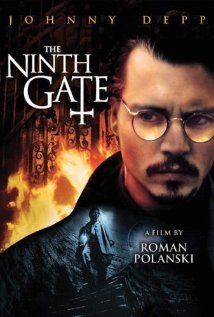
THE NINTH GATE
US/France, 1999, 133 minutes, Colour.
Johnny Depp, Frank Langella, Lena Olin, Emmanuelle Seigner, Barbara Jefford, Jack Taylor, James Russo.
Directed by Roman Polanski.
The Ninth Gate is based on a rather exotic novel by Arturo Perez Reverte. It concerns Satanic worship, documents from past centuries, spells and incantations, rituals for the summoning of the devil.
The film has been directed by Roman Polanski, a director who has worked on a variety of genres for over 50 years. One of the earliest films in his career was the classic, Rosemary’s Baby, 1968.
Johnny Depp portrays an agent who is hired by a New York academic with a great interest in the occult, Frank Langella. His journey takes into both Spain and France, seeking out the authenticity of an alleged satanic book, finding that owners are killed, experiencing the protection of a strange woman who seems to be a guardian angel, played by Polanski’s wife, Emmanuelle Seigner.
This is one of the better films portraying searches for satanic power, with a strong cast including Lena Olin and Barbara Jefford it as one of the owners and quite a climax illustrating the self-deception of Satanic worshippers – but ending with the obsession for power of the man who sought out the book..
1. The appeal of the occult, of Satanism? Evil? Power? The book and the power of the Ninth Gate, the credit sequences and the passing through the previous the gates?
2. Roman Polanski and his career, memories of Rosemary’s Baby and other films?
3. The international settings, New York City, Spain and the countryside, France, Paris, the French countryside? The blend of the ordinary and the exotic? Shops, libraries, hotels, the river Seine? The musical score and atmosphere?
4. The credibility of the plot, of the occult, the diabolical books from the past, of Lucifer writing books, of sects, executions of dissenters, followers and cults, motivations?
5. Dean Corso and his story, his perspective on the books and Satanism? The opening, advising the couple about selling their library, the Don Quixote books and his smooth swindling of the couple? Other advice and consultation? His going back to the shop? With Bernie and the discussions? Leaving Balkan’s book with Bernie for safety, coming back and finding him dead, hanging like the illustrations in the book?
6. Balkan, New York academic, his vast library, his interest in the book and the Ninth Gate, his confidence, arrogance? Consulting Corso? His interest in the other copies, wanting to check authenticity, his motives?
7. The suicide sequence, the owner of the book? His widow, Corso meeting her, a French background, glamorous and allure? Her husband and his death, people accusing her of marrying for the money, but her wanting the book? The clash with Corso? Her reputation, the Château, the books? Her arriving in Paris, the hotel, her henchmen and his attempt on Corso’s life? The car pursuit and their going to the Château?
8. Corso and his commission, payments and interest in money? Going to Spain, the encounter with the twins and their giving information? Going to see Fargas, the discussions, the copy, examining it, Balkan and his telephone calls, the deaths?
9. Corso and his lack of faith, business priorities, serious, the search, looking at the illustrations, the comparisons, the different details, the Lucifer signature?
10. The young woman, anonymous, her mysterious presence, watching Corso, within the context of society, her clothes, mystery appearances? Helping him? The discussions, his curiosity? In Spain, preserving him? In Paris, saving him from the attack at the Seine? Getting the car, driving? The discussions in Corso’s hotel room? Going to the Château, the sexual encounter and its effect on Corso, seduced by the devil? Her be enigmatic, her relationship with Balkan, with the devil? Offering Corso the remaining pages, and her appearance in one of the illustrations?
11. The visit to the Baroness, her manner, her study, writings, haughty, dismissing Corso, his return, the photocopies, arousing her interest, the comparisons of the illustrations, his explanations? His continuing to study, his being hit, discovering the Baroness strangled? The phone call from Balkan?
12. The hotel room, hiding the book, it’s being taken? The phone call from Balkan?
13. Corso and his walk, at the river Seine, the attack, the fight, the girl saving him?
14. Getting the car, chasing the widow, the village, information, arriving at the Château? The cultists arriving, their black robes, their assembling? Corso, confronting the widow, her henchmen confining him, trapping him on the stairs, his death? The robes, Corso infiltrating the ritual? The reading from the book, the power, the cultists?
15. Balkan his ordinary suit, intruding, his mocking of the people present, the confrontation with the widow, killing her? Taking the book? Corso watching? Finding Balkan, Balkan’s arrogance, explaining the ritual, Corso falling through the floor, the circle of fire, setting himself alight, the irony of his death, Corso
shooting him to put him out of his misery?
16. Corso, the promise of the other pages, his being tempted, seduced by the girl, going to the venue, the men who were not twins, the cupboard falling over, the pages? His taking them – and driving away into the same fate?
17. An elegant film about the occult?
Published in Movie Reviews
Published in
Movie Reviews
Tagged under
Saturday, 18 September 2021 19:54
Flubber
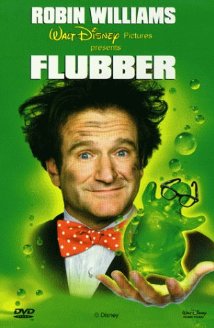
FLUBBER
US, 1997, 93 minutes, Colour.
Robin Williams, Marcia Gay Harden, Christopher Mac Donald, Ted Levine, Clancy Brown, Raymond J.Barry, Wil Wheaton, Edie Mc Clurg.
Directed by Les Mayfield.
This is a re-make of Disney's popular 1960s film, The Absent- Minded Professor, with Fred Mac Murray. In the 90s, Robin Williams is more frantic and the special effects more elaborate and zanier. Robin Williams appeared in Good Will Hunting at this time and won an Academy Award for best Supporting Actor. Marcia Gay Harden won an Oscar in 2000 for Pollack.
Special effects had improved since the 1960s and there are all kinds of humorous situations, including bouncing golf balls and basketballs hitting mock goons, the car flying through the air, flubber on the shoes of basketball players who win a game.
Robin Williams brings some humanity to his role, especially his love for Sarah – although she has been left at the altar three times. Christopher McDonald? plays and academic villain. Raymond J.Barry is a benefactor of the University, wanting his son to get into Harvard, and the comic goons are played well by Ted Levine and Clancy Brown.
Les Mayfield also directed The Mighty Ducks, Miracle on 34th Street, Blue Streak. The screenplay was co-written by John Hughes, best known for such comedy is as The Breakfast Club, Ferris Buehler’s Day Off.
1. Disney in the 1960s, in the 1990s? Fred Mac Murray in the past, Robin Williams in the 1990s?
2. The verve of the 1990s version, comic, slapstick, verbal humour, family entertainment?
3. The University, offices, laboratories, experiments? The church and the wedding? The musical score, the songs? The humour of having so many television clips to comment on the action?
4. The special effects, the experiments, flubber itself, balance, hitting the thugs with the balls, the car flying, the basketball match?
5. Robin Williams as Philip, absent-minded, his computer companion and their conversation? Sarah, love, the reminder of the wedding, the being left at the church? Wilson as his rival? His involvement in experiments, his robot against the wedding, the explosion, the forming of flubber, his forgetting the wedding?
6. Sarah, nice, the work at the University, left at the church twice, the dress fitting, talking with her friend, with Philip? Her reaction to his forgetting, leaving the church, Wilson to escort her? Philip visiting the office, her not wanting explanations? No excuses?
7. Wilson, the rival, taking Philip’s ideas, his eye on Sarah, at the church, the discussions with Philip, the threats, giving Sarah the lift? His smug smile?
8. The flubber, its capacity for flying? The benefactor wanting to steal the flubber? The deals with Philip? His thugs, watching, the slapstick of their being hit with the balls? His son, failing, Philip and his principles, the pressure? The confrontation, no deal?
9. Philip, flying with the car, with his robot companion, through the skies, outside the window, taking Sarah for a ride?
10. Wilson, the benefactor, the flubber and the causing of mayhem, Wilson swallowing it and eliminating it?
11. The humour of the child, the fear of the dark, looking out the windows, everything appearing at the windows, his nightmare on the plane?
12. Happy ending, love and progress with the flubber?
Published in Movie Reviews
Published in
Movie Reviews
Tagged under
Saturday, 18 September 2021 19:54
Adventures of Sherlock Holmes, The
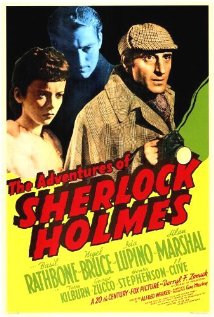
THE ADVENTURES OF SHERLOCK HOMES
US, 1939, 85 minutes, Black-and-white.
Basil Rathbone, Nigel Bruce, Ida Lupino, Alan Marshall, Terry Kilburn, George Zucco, Henry Stephenson, E. E. Clive, Mary Gordon.
Directed by Alfred L Werker.
In 1939 a version of The Hound of the Baskervilles as well as this Adventures of Sherlock Holmes were released and began the 14-film series of Sherlock Holmes stories with Basil Rathbone and Nigel Bruce as Holmes and Watson. This film had a bigger budget from 20th Century Fox and a more notable cast from the period. The rest of the series was made at Universal Studios, shorter in running time and with less starry casts.
This film also introduces Professor Moriarty played by George Zucco, a sinister figure, freed from a murder charge, interfering in the lives of a wealthy family and hiring an assassin, but all the time intending to steal the Crown Jewels.
Basil Rathbone made his mark as one of the best impersonations of Sherlock Holmes, with Nigel Bruce creating a naive and bumbling character as Dr Watson. Ida Lupino plays a threatened woman and Alan Marshall her fiance.
There are complications with the threats to a family, a plan for revenge which is carried out. The fiance comes under suspicion, especially as Dr Watson sees him at a meeting with Moriarty. However, with the suspense of the murders and the chase, the attention is then given to Holmes confronting Moriarty at the Tower of London.
This film was directed by Alfred L. Werker but most of the films and series at Universal were directed by Roy William Neill.
1. The first in the series of the Rathbone- Bruce Holmes and Watson films?
2. Production values, black-and-white photography, re-creation of the period, the cast, the score?
3. The title, the introduction, to Holmes, to Watson, to Moriarty? Audience knowledge of these characters and expectations?
4. The familiar aspects, the apartment in Baker Street, Sherlock Holmes and his lifestyle, the friendship with Watson, the care of Mrs Hudson, the boy cleaner of the rooms, visitors to Baker Street, Holmes and his methods, research, deduction, facts and logic, his capacity for disguise? Holmes as a strong character, his manner, speech? The contrast with Watson, bumbling, naive, but enthusiastic?
5. The status Moriarty, arch villain, acquitted for murder, his plans, the visit to Jerrold, implicating him in tilt? His hiring of the South American assassin? His plan to steal the Crown Jewels, diverting attention away from his plan? The attempts at execution? Confrontation with homes?
6. Ann, her family background, concern about her brother, the notes and the threats, the murder of her father, the theme of the Ancient Mariner? Jerrold, protecting her, the puzzle about his implications?
7. Watson, following Jerrold, seeing Moriarty come out of the meeting? Communicating his suspicions?
8. Lloyd, the threats, his defying them, walking home, Jerrold following him, the suddenness of the murder? Revelation of the killer, the South American
dispute, revenge? Moriarty using him?
9. The real crime, the jewels, Holmes confronting Moriarty, the struggle?
10. Moriarty to live another day?
11. The happy ending to the romance?
Published in Movie Reviews
Published in
Movie Reviews
Tagged under